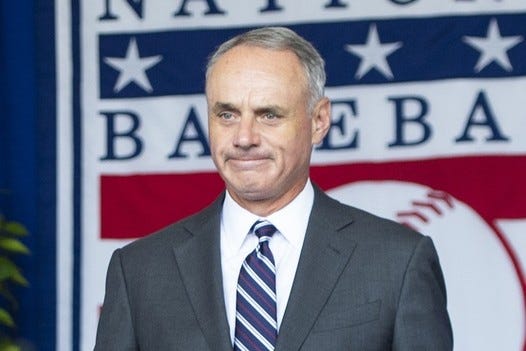
Based on the March 26 agreement with the players union, Manfred confirmed he’s able to force a schedule — which many believe will be much shorter than what either side has proposed — if the two sides can’t come to terms at the present time.
That said, try polling 100 baseball fans who are craving the chance to watch the game they love, and it’s likely none of them will do jumping jacks and somersaults over a schedule that could be as short as 48 games. They’ll likely be relieved baseball is back, but grumpy over the missed opportunity to start the season July 4 weekend.
“I’m a big believer in the process,” Manfred explained to ESPN. “I would prefer to negotiate with the MLBPA that gets us more games and resolves the issues that have separated us amicably.”
The union’s latest offer on Tuesday was for 89 games and full prorated salaries. Baseball wants the players to take an additional pay cut because of the strong likelihood games will happen in empty ballparks. MLB has offered 82, then 76 games, with additional pay reductions. Manfred said they’re going to respond to the players’ association latest pitch soon.
“We’ll make another proposal to them that’s consistent with the economic realities that we’re looking at,” Manfred said on ESPN, “including the fact that our revenues are gonna to be down over 70 percent, and hopefully we’ll find some flexibility on the other side and make an agreement.”
Manfred said on ESPN the March 26 agreement “was premised on the mutual belief” that games would take place with people in the seats. He explained the realization that fans won’t be in the stands changed things economically and required further negotiations.
The league doesn’t want to play deeper into the fall as its medical advisors have warned of a possible second wave of the coronavirus.
“I don’t wanna be responsible for the additional health risk associated with going later in the fall, the risk to not completing the season, the disaster that that would be,” Manfred expound on when talking with MLB Network. “I think the most prudent course for everyone is to follow the advice of the experts on this one.”
ESPN’s Karl Ravech asked Manfred when is the deadline to where Manfred must implement the shorter schedule. While Manfred didn’t have a specific date, he made it clear that, “Each and every day that goes by, we lose the capacity to play at least one game.”
Tick tock. Tick tock.

